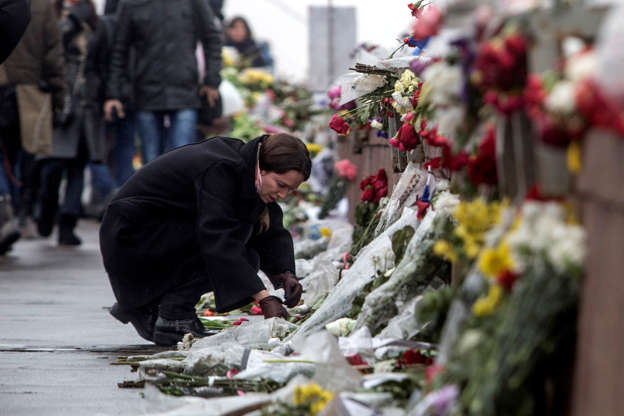The grisly public slaying of their dean last month was just the latest setback for Russia’s beleaguered political opposition, well accustomed in recent years to being muzzled, sidelined and restricted.
But Boris Nemtsov’s killing means that for the first time, the Russian opposition must carry on without the man who was its chief organizer and arbiter.
Russia’s opposition leaders also understand that they have to resolve their internal differences, refine their public message and broaden their shrinking base of financial, political and popular support to avoid obsolescence in a society rallying around Russian President Vladimir Putin’s warnings against “fifth columns” and “traitors.”
No one was better positioned to meet such challenges than Nemtsov, a deputy prime minister under Boris Yeltsin who once outranked Putin and who could bridge the divide between the streets and the elites. It’s also why opposition members think Nemtsov is “impossible” to replace — and why his death is a warning to other high-profile critics of Putin’s policies to beware or suffer the consequences.
“Nemtsov’s murder terrified people who are still hesitating between being silent or supporting me, for example,” said Alexei Navalny, now arguably the best-known face of the Russian opposition. The killing was a message, he said: “Maybe you are not satisfied, but just don’t move in this direction, because this is bad. You think we won’t kill somebody who is famous all over the world?”
“No problem,” Navalny continued. “We will kill this person as well. That is the message.”
Opposition leaders such as Navalny are used to the threats, lawsuits and jail time that come with speaking out against the Kremlin in today’s Russia.
But disgruntled oligarchs — even those who have seen their fortunes shrink under sanctions that have isolated Russia’s economy over the past year — still have plenty to lose from backing the opposition.
Non-elites also appear to have been cowed by increasingly hostile rhetoric. Despite a punishing economic crisis, a war in neighboring Ukraine and cutbacks to social services, the opposition has not been able to replicate the huge anti-Kremlin protests in 2011 and 2012, which drew more than 100,000, just before Putin returned to power.
Part of that can be attributed to fear and fatigue. But some opposition members say it is also because they haven’t found the right message — or the right way to sell it.
“We don’t have an issue, an idea, that can win the hearts of the population,” said Gennady Gudkov, an outspoken Putin critic who was stripped of his seat in parliament in 2012. “We are trying to find something that can penetrate and get through all these obstacles and problems that are created by the powers. But unfortunately, frankly speaking, we still don’t have it.”
Gudkov said threats to potential financiers, a closed news media and a numbed population are obstacles to anyone — even someone as charismatic as Nemtsov — hoping to promote the opposition in the current political climate.
Others remain more optimistic about the opposition’s future.
Navalny, for example, insists that the majority of the population supports the components of his “European way of development,” including fighting corruption, cutting defense in favor of social spending and ensuring direct elections.
But survey responses on issues such as corruption haven’t translated to more action “because people don’t make the connection between these things and the fact that they live poorly,” Gudkov said.
Last year, the war in Ukraine rallied tens of thousands of Russians to peace marches — but failed to promulgate any greater movement. Before Nemtsov’s death, the opposition had been focusing on the economic crisis to rouse anti-Kremlin sentiments — but a planned “anti-crisis” march turned into a memorial procession after his slaying.
Some members of the opposition think the investigation of Nemtsov’s death — being blamed on Chechens — is their best chance to pressure the Kremlin.
“It could open the whole political system of Russia, how it works and how it is dangerous for everyone,” said Vladimir Ryzhkov, one of the co-chairs of Nemtsov’s party, RPR-PARNAS.
The swirling opinions among the dozen or so leaders of the opposition mulling how to proceed post-Nemtsov illustrate the challenges of choosing a way forward.
Many think the greatest way to honor Nemtsov’s memory is imitating his legacy as the glue that held various opposition factions together. Several opposition members said they want to unveil a unified platform opposing Putin’s strong-man rule by early next month.
“All opposition leaders should forget about ambitions, our old scandals, and just try to sit on the roundtable and start the conversation,” Ilya Yashin, head of Nemtsov’s party in Moscow, said in an interview. “If we’ve got solidarity and can work together, it will be a big answer to this challenge.”
Vladimir Milov, head of the Democratic Choice party, thinks disagreement and competition are healthy.
“It’s not a crime to be ambitious when you’re in politics,” said Milov, who plans to support the coalition’s new platform.
“Russia suffers, politically, economically and psychologically, from this idea that we have to have one big czar,” he said. “You make yourself vulnerable to put all your stakes on one person, because this is how the Kremlin operates.”
































